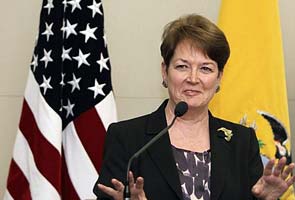
Heather Hodges
Foreign Minister Ricardo Patino announced Ambassador Heather Hodges' expulsion at a news conference.
He said the ambassador, called to his office the previous afternoon, had not explained what led her to suggest in the 2009 cable that Correa knew of "supposed acts of corruption by members of the police leadership and more specifically the former commander of the institution, Jaime Hurtado Vaca."
"We have asked that she leaves the country as soon as possible," Patino said.
In a later interview on radio, Correa criticized the ambassador for linking him to the "corruption of a bad officer."
"I think this is part of Amabassador Hodges that has never wanted our government," Correa said.
The State Department called the expulsion "unjustified" and described Hodges as "one of one of our most experienced and talented diplomats."
The U.S. typically responds to such cases by expelling the country's ambassador, but department spokesman Mark Toner said it would be premature to say how it would respond. Officials said it could jeopardize consulates that Ecuador has recently reopened or announced plans to open in New Orleans and Phoenix.
Patino stressed that the expulsion was not directed against the Obama administration: "We hope this will not affect the cordial relations between our two governments."
"It is unfortunate that the published documents on WikiLeaks have made it impossible to continue collaborating with the current ambassador to Quito, but we hope to work with a new ambassador," Ecuador's Washington embassy said in a statement.
Hodges issued a statement saying the order "left me saddened tremendously, both personally and for this country."
"I will not speculate about what this can mean," she added.
Hodges is the second U.S. ambassador to fall victim to WikiLeaks, which has released more than 6,300 State Department cables since November through international news media.
Last month, Carlos Pascual resigned as chief envoy to Mexico after disparaging comments he made in cables divulged by the activist group angered President Felipe Calderon.
Correa has now expelled three U.S. diplomats since taking office in 2007. While a close ally of leftist Presidents Hugo Chavez of Venezuela and Evo Morales of Bolivia, Correa has been far less antagonistic with the United States.
Hodges' expulsion will leave all three nations without U.S. ambassadors.
Bolivia expelled the U.S. ambassador in late 2008, accusing him of inciting the opposition, while Venezuela has been without a chief U.S. envoy since July after objecting to the candidate named by Washington.
The ranking Democrat on the U.S. House's foreign affairs subcommittee on the Western Hemisphere, Rep. Eliot Engel of New York, said Correa's decision to expel Hodges is "whimsical and impulsive and comes at a great cost to his own people."
Engel said in a statement that the expulsion seriously undermines Ecuador's chances of having a stalled trade preferences act with the United States reinstated.
In the WikiLeaks cable, dated July 10, 2009 and published by the Madrid newspaper El Pais on Monday, Hodges recommends that Hurtado, police commander from April 2008 to June 2009, be stripped of his U.S. visa. She says he used the position "to extort cash and property, misappropriate public funds, facilitate human trafficking, and obstruct the investigation and prosecution of corrupt colleagues."
It says "Hurtado's corrupt activities were so well known" in the upper ranks of the police that "some Embassy officials believe that President Correa must have been aware of them when he made the appointment. These observers believe that Correa may have wanted to have a (national police) Chief whom he could easily manipulate."
Separately, Hodges comments in the cable that "corruption among Ecuadorean National Police officers is widespread and well-known," with "minimal risk of exposure or punishment" for those engaging in corrupt acts.
"As with corrupt politicians and judges, this situation is more pronounced at higher levels of power," Hodges added.
The cable says internal Ecuadorean police investigations had suggested Hurtado was engaged in "corrupt activities within the ENP since the early 1990s."
It also alleges that Hurtado received "gifts and cash payments" from a police colonel in Guayaquil who was earning $1,000-$2,000 for each Chinese migrant he assisted in obtaining transit to Central America en route to the United States.
Notably, both of the U.S. diplomats previously expelled by Correa's government had been accused of meddling in police-related matters.
One had questioned, in early 2009, Hurtado's decision to transfer the head of the Special Investigations Unit, threatening to cut off U.S. aid to the group. The other allegedly suspended $340,000 in annual aid because Ecuador would not allow the U.S. to veto appointments to the anti-smuggling police.
Ecuador is a smuggling conduit for cocaine produced in Colombia and Peru and, while U.S. and Colombian officials have publicly praised its counter-drug cooperation, they have privately expressed concerns about high-level corruption.
No comments:
Post a Comment